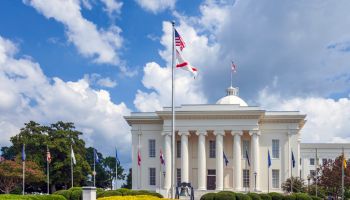PORT SULPHUR, La. — This Fourth of July weekend in New Orleans will be packed with nearly 300,000 people, as the National Education Association holds its annual convention. Folks from across the country will descend on the Crescent City for three days of partying and concerts, featuring Mary J. Blige, Alicia Keys, Janet Jackson and Earth, Wind & Fire — all headliners at the 16th annual Essence Music Festival.
But for the residents in this rural town, as well as others in Pointe a la Hache, the county seat of Plaquemines Parish, they, too, are concerned about the earth, wind and fire. Yet it’s not the musical group. Instead, it’s the devastation being wreaked on their way of life in the region as a result of the BP oil catastrophe, the worst environmental disaster in American history.
While local, state and federal officials throw as many resources as possible to prevent the millions of gallons leaked thus far from causing more damage to the beaches and coastline of the Gulf Coast, the residents here are under a heavy degree of stress. Some are admittedly still facing post-traumatic stress, a result of Hurricane Katrina five years ago. And now, they face the possibility of losing their livelihood as the oil makes its way to the east bank of the Mississippi River.
The water means everything to the people here. The local economy is based entirely on the money earned from the fishing industry, and since May, their boats have been idled because of the oil disaster.
I am here to shoot a special for my TV One cable network show, “Washington Watch.” This town is largely African-American, and considering our network targets blacks, it was an ideal place to focus our attention. But the heartache and strain I am hearing in Pointe a la Hache is the same in other towns, whether the faces are white, Hispanic or Asian.
It really is hard to fathom what this disaster will do to the residents here, many of them third-generation fishermen. The water is all they know, and if they can’t make a living doing this, there really is nothing else to do. The countryside of southern Louisiana is gorgeous, the heat stifling and the mosquitoes plentiful, but this is very much a coastal community. There are no massive shopping centers, large manufacturing facilities or high tech parks.
The bottom line: No fishing; no money; no life.
On Thursday evening, a number of the town’s residents filed into the Greater Mount Sinai Baptist Church in Port Sulphur for a community rally with the Rev. Jesse Jackson Sr. Prior to the meeting, several of the fisherman vented their frustration to the Rev. Tyronne Edwards, who has been a leading voice on the oil disaster here, and Billy Nungesser, president of Plaquemines Parish.
Nungesser told the fishermen — many dressed in T-shirts, jeans and work boots — that he feels their pain. He is doing everything he can to fight through the bureaucracy and get resources to the fisherman, namely jobs converting their fishing boats into 300 skimmers to pick up the oil.
“This week they (BP) are supposed to put a whole ‘nother crew of boats out and rotate some of them off on a 30-, 60-, 90-day (schedule) to get some money for the people that ain’t been” working, he said, adding that the outside contractors are being paid $3,000 a day for oil cleanup.
“What we are trying to do is get work for all of the fishermen full time.”
Rev. Edwards, with a black-and-gold Bible in hand, said it’s time for President Barack Obama to come to small towns like Pointe a la Hache and hear firsthand from the men and women who are scraping by, angry with the bureaucracy that is preventing the resources from flowing.
Rev. Edwards is still seething from a meeting last week with Kenneth Feinberg, the Washington, D.C., attorney appointed by President Obama to oversee the $20 billion fund BP established to assist victims of the disaster.
“This guy sounds like BP all the way,” said Edwards, who didn’t like Feinberg suggesting to fishermen that it’s best that they take $100,000 now instead of trying to sue.
“He’s detached,” Nungesser chimed in.
It’s clear that frustration is running high. And whether it’s BP, Gov. Bobby Jindal or President Obama, residents here are in unanimous agreement: More can be done, and it needs to be done now.
One fisherman said that Plaquemines Parish is their home and they want to see it thrive, but things are reaching a boiling point.
“What do we have to do? Wreak havoc down here to get people’s attention because that’s what it’s coming to.”
Roland S. Martin is an award-winning CNN analyst and the author of the forthcoming book “The First: President Barack Obama’s Road to the White House as originally reported by Roland S. Martin.” Please visit his website at www.RolandSMartin.com. To find out more about Roland S. Martin and read his past columns, visit the Creators Syndicate Web page at www.creators.com.
COPYRIGHT 2010 CREATORS.COM















